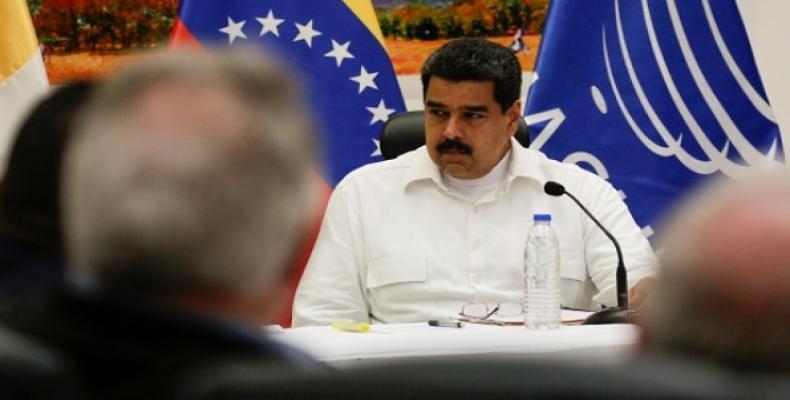Caracas, October 31 (RHC)-- The Venezuelan government and opposition have gone to the negotiating table after months of increasing tensions, setting an agenda for ongoing talks focused on four key issues in the name of tackling the political and economic crisis affecting the country.
President Nicolas Maduro and members of his socialist PSUV party met Sunday with leaders of the right-wing opposition coalition known as the MUD, or Democratic Unity Roundtable. The meeting was held with the mediation of the Vatican and regional bloc UNASUR on Sunday in Caracas.
According to reports from the Venezuelan capital, fractures in the broad opposition coalition showed in the immediate lead-up to the dialogue. A group of 15 currents of the MUD came out against going to the negotiating table with the government, while one of the three main parties in the coalition -- jailed opposition leader Leopoldo Lopez’ Popular Will party — dropped out of the talks at the last minute over complaints that its conditions related to what his supporters call “political prisoners” were not met. MUD secretary general Jesus “Chuo” Torrealba led the opposition delegation.
Despite lasting intransigence in some sections of the splintered opposition, both sides of the conflict agreed to an agenda to divide up the dialogue process into four main issue areas: peace, respect for the rule of law and sovereignty; truth, justice, human rights, reparation for victims, and reconciliation; economic and social issues; and building truth in the electoral process and schedule.
Vatican envoy Archbishop Claudio Maria Celli, accompanied by UNASUR head Ernesto Samper, announced that “the government and the opposition agreed to tone down the aggressive language used in political debate,” citing an effort to “maintain and preserve an atmosphere of peace and harmony.”
In recent weeks, the government and opposition have traded political daggers, with both sides of the political spectrum accusing their rivals of staging a coup. A recent decision from National Electoral Council to suspend the process of organizing a recall referendum against Maduro over irregularities in the collection of signatures angered the opposition, prompting the National Assembly to push for an impeachment process against the president. Despite being largely symbolic given that the Supreme Court has declared the parliament illegitimate for seating fraud-accused lawmakers whose elections were never certified, critics of the impeachment bit argue that the effort mirrors the recent parliamentary coup against former President Dilma Rousseff in Brazil.
With hopes of easing the tense situation, the two sides are set to meet again Monday before putting work on hold for over a week, with a scheduled return to negotiations on November 11th in Caracas. Leopoldo Lopez’s party is also expected to join the process as it advances in the coming days, according to EFE. Lopez is serving prison time over charges of fomenting violence that during hostile opposition protests in 2013 that led to the deaths of 43 people.
The opposition has called for mass marches this Thursday on the presidential palace in Caracas, known as Miraflores. Pro-government forces have also vowed to match opposition demonstrations in the streets in support of the Maduro government.
Venezuelan Government and Opposition Agree to Agenda for Dialogue


